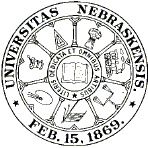
University Studies (University of Nebraska) (1888–1984)
Date of this Version
7-1906
Citation
UNIVERSITY STUDIES, Vol VI, No, 3, July 1906.
Abstract
It is not solely the fault of our critlcs that we have no such criticism as the French; it is also the fault of our literature. To write a history of English literature like M. Lanson's history -of French literature is, even on that small scale, impossible from the nature of the subject. . To be sure, there is no such general interest in the former as in the latter. The historian or the critic who undertakes French letters finds an opinion already formed, a canon already established. His meal is at least partly ground for him; ' he has only to make his dough. But this is not all the difference. English literature, unlike the French, does not constitute a coherel1t body of thought, a consistent "criticism of life," with a fairly continuous growth or evolution ; and a similar treatment of it,as a branch of intellectual development, is therefore out of the question . . In fact, our literature is not so largely an affair of definition; not only is it poorer in ideas, it is also patterned less closely in accordance with theory. In all English there is no example of the genre tranche, such as Sainte-Beuve loved; hardly of a conscious school o~ formula, or even of a preconceived purpose. It is individual, capricious, empiric, indiscriminate.
Corneille, Theatre; Racine, Theatre; Voltaire, Oedipe, Brutus, Zaire, la Mort de Cesar, Alzire, Mahomet, Merope, l'Orphelin de la Chine, Tancrede, les Scythes, les Guebres; Shakespeare, Hamlet, Othello, King Lear, Macbeth; Johnson, Sejamls, Cataline; Dryden, The Conquest of Granada, Don Sebastian, All for Love; Goethe, Iphigenia auf Tauris; Schiller, Die Braut von Messina; Aeschylus, Prometheus Vinctus, the Oresteia; Sophocles, Tragoediae; Euripides, Hippolytus, Iphigenia at Aulis and at Tauris, Medea, Electra, Orestes, Hecuba, the Bacchae; Seneca, Tragoediae.


Comments
Published by the University of Nebraska